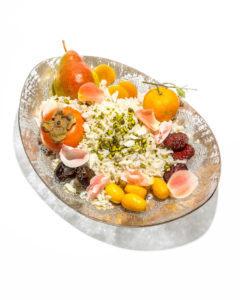Join in an Indian Jewish celebration in honor of Elijah the Prophet and on the occasion of the Rebbetzin’s birthday.
This is a lovely Bene Yisrael event. The Malida refers to a particular type of food – a home-made, sweet, dessert delicacy that consists of pieces of ricebread made with sweet poha that are smeared thickly with syrup.

Malida celebration Jewish Thornhill tu beshvat
A special, large, platter-like dish is filled with the malida concoction and nicely arranged, along with seven different kinds of fresh fruits, two of which should be new fruits [one of the two new fruits must be from “the fruit of the tree (fruits)”, that is, one “Ha-Etz” in Hebrew, and the other new fruit must be from “the fruit of the earth (vegetables)”, that is, one “Ha-Adama” in Hebrew]. The dish is also adorned with flowers. Scented flowers or cloves are used for the “Besamim” blessing (“Besamim” means “Spices” in Hebrew, specifically referring to the spices that are blessed by reciting the “Besamim” blessing).
After making beracha (blessings) on the fruit, a song praising Elijah as the forerunner to the Messiah. After the singing the prayer-song for Elijah the Prophet, many different blessings, quoted from the Hebrew Bible, are recited, the first of which begins with the Hebrew words “Vayiten Lecha” or “Vaiten Lechah” (“May G-d Give You” in Hebrew). Another blessing quoted from the Hebrew Bible that is recited – three times – is “Ha-Malach Ha-Goel” (“May The Angel Who Redeems Us…” in Hebrew). The readings from the Hebrew Bible conclude with the reading of Psalm 121. After the malida ceremony, the fruits are then eaten by the participants.
The malida ceremony is essentially a ceremony that has roots in and honors Elijah the Prophet in addition to offering a thanksgiving to G-d in the form of food, the singing of prayer-songs, highlighted by the prayer-song honoring Elijah the Prophet (similar to the prayer-song for Elijah the Prophet in the melave malkah ceremony).
The malida ceremony is performed on happy occasions such as a new house, the birth of a child, and marriage. It is also customary in many Bene Israel families to have a Malida on the occasion of the Jewish holiday of Tu B’Shevat (occurring in either January or February, depending on the year), which is the “New Year of Trees” or the “New Year For Trees”. The reason is that this is a holiday to thank G-d for blessing us with the new fruits of spring.
Own own community’s added occasion for holding a malida is The Rebbetzin’s birthday.

Rebbetzin Gail Michalowicz in Thornhill
